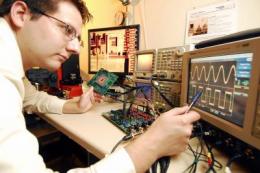Project pioneers use of silicon-germanium for space electronics applications
 Georgia Tech student researcher Troy England works in the laboratory with a device containing silicon-germanium microchips, seen in his left hand. Credit: Credit: Gary Meek
Georgia Tech student researcher Troy England works in the laboratory with a device containing silicon-germanium microchips, seen in his left hand. Credit: Credit: Gary Meek
 Georgia Tech student researcher Troy England works in the laboratory with a device containing silicon-germanium microchips, seen in his left hand. Credit: Credit: Gary Meek
Georgia Tech student researcher Troy England works in the laboratory with a device containing silicon-germanium microchips, seen in his left hand. Credit: Credit: Gary Meek
A five-year project led by the Georgia Institute of Technology has developed a novel approach to space electronics that could change how space vehicles and instruments are designed. The new capabilities are based on silicon-germanium (SiGe) technology, which can produce electronics that are highly resistant to both wide temperature variations and space radiation.
Source:
physorg
 Georgia Tech student researcher Troy
Georgia Tech student researcher Troy  Georgia Tech student researcher Troy
Georgia Tech student researcher Troy  Georgia Tech student researcher Troy
Georgia Tech student researcher Troy  Georgia Tech student researcher Troy
Georgia Tech student researcher Troy  Previous page
Previous page
 Back to top
Back to top